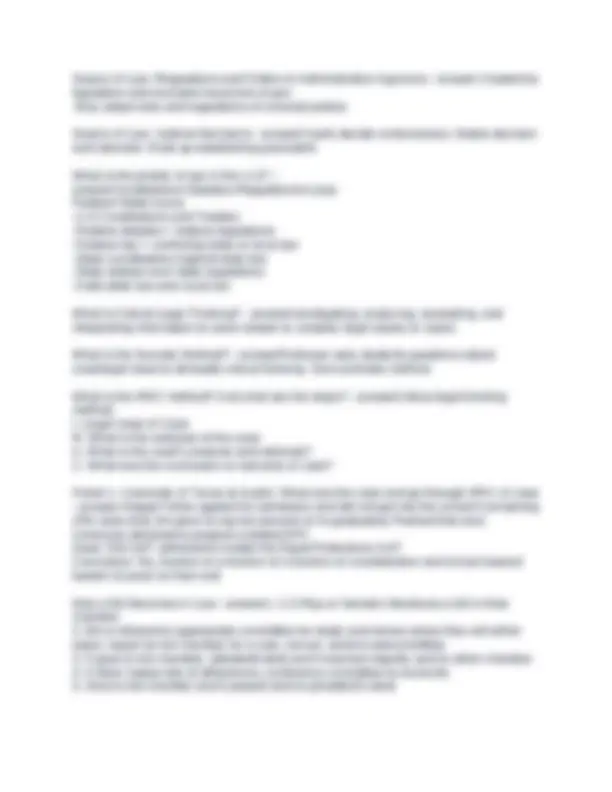




Study with the several resources on Docsity

Earn points by helping other students or get them with a premium plan


Prepare for your exams
Study with the several resources on Docsity

Earn points to download
Earn points by helping other students or get them with a premium plan
Community
Ask the community for help and clear up your study doubts
Discover the best universities in your country according to Docsity users
Free resources
Download our free guides on studying techniques, anxiety management strategies, and thesis advice from Docsity tutors
Business Law 10th Edition Henry Cheese man Chapter 1. Questions and Answers
Typology: Exams
1 / 4

This page cannot be seen from the preview
Don't miss anything!



What is Law? - answer The rules and regulations made and enforced by government that regulate the conduct of people within a society. The definition is broad so it can be flexible throughout time What are the eight main functions of law? - answer Keeping the peace, Shaping moral standards, promoting social justice, maintaining the status quo, facilitating orderly change, facilitating planning, providing a basis for compromise, maximizing individual freedom. Or PMJSCPCF? Stan defer v. United States (Chief Justice Warren Burger) - answer Fairness of the law. Different juries may reach different results under our criminal statute. Consequence under our jury system Judge Jerome Frank - answer Flexibility of the law is necessary to evolve and change with norms of society. Brown v. Board of Education - answer1954 - The Supreme Court overruled Plessy v. Ferguson, declared that racially segregated facilities are inherently unequal and ordered all public schools desegregated. Overruled separate but equal and goes along with flexibility of the law What are the schools of jurisprudential thought? - answer-Natural -Historical -Analytical -Sociological -Command -Critical Legal Studies -Law and Economics Natural Law of Jurisprudential Thought - answerLaw is based on what is "correct". Emphasizes moral theory of law Historical Law of Jurisprudential Thought - answerLaw is an aggregate of social traditions and customs. Analytical School of Jurisprudential Thought - answerLaw is shaped by logic Sociological School of Jurisprudential Thought - answerLaw is the means of achieving and advancing certain sociological goals
Command School of Jurisprudential Thought - answerMaintains legal rules are unnecessary and legal disputes should be solved by applying arbitrary rules based on fairness Law and Economics School of Jurisprudential Thought - answerPromoting market efficiency should be the central concern of legal decision making English common Law - answerLaw developed by judges who issue opinions with case becoming precedent for later How can English common law courts be divided? Define. - answerBy law courts: Valued legal procedure over merit of case. Only monetary awards Equity courts/Court of Chancery: Unfair results and limited remedies available. Merchant courts: Common trade practice Penny v. Little: Justice Douglas on Adoption of English Common Law - answerIn U.S law, equity and merchant courts have been merged. Justice Douglas mentions how the law used to be simple and crude but polished with advanced in civilization. Romano-Germanic Civil Law System - answerLegal system that dates back to 450 BCE when Rome adopted the Twelve Tables, a code of laws applicable to the Romans. Commonly known as civil law. Corpus Juris Civilis (Body of Civil Law) - answerCompleted in 534. Joined with national codes, French Civil Code (Napoleonic Code) and German Civil Code of 1896 What are the Sources of Modern Law? - answerConstitutions, Treaties, Federal Statues, State Statutes, Ordinances, Executive Orders, Regulations and Orders of Administrative Agencies, Judicial Decisions Source of Law: Constitutions - answerU.S Constitution establishes federal government and powers. Powers not given to fed are reserved to states and states also have their own constiutions. Source of Law: Treaties - answerPresident and consent of 2/3 Senate may enter treaties with foreign governments. Source of Law: Codified law: statutes and ordinances - answerStatutes: enacted by Congress and state legislatures Ordinances enacted by municipalities and local government Establishes courses of conduct that covered parties must follow Source of Law: Executive Orders - answerIssue by President of State Governors. Regulate the conduct of covered parties